compassion
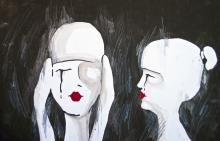
As humans, we have an innate desire to see and understand. We want to feign comprehension, in order to avoid the despair of our limited understanding. I’ve noticed this phenomenon recently in what started as a personal experience. I was born with a rare genetic condition that causes my skin to blister much more easily than the average person. It is my normal. There are not many people on the planet who can actually understand. However, this has not stopped countless people from trying to convince me they do.

ON A BALMY SUMMER afternoon in July, I rang the bell at Jean Vanier’s sky-blue gate in Trosly-Breuil, France. Vanier, the founder of L’Arche, an international federation of communities of people with and without developmental disabilities, is central to a new documentary film, Summer in the Forest. I was there to interview him about the film and as research for a play I’m helping to write for the 50th anniversary of L’Arche Daybreak community, near Toronto.
As the gate opened, Vanier, wearing his signature navy blue jacket, greeted me with the warmest presence I have ever felt, saying, “All the way from Daybreak you have come to visit me!” I replied sheepishly, “Yes, to finally meet the man who changed my life.”
My salutation was not hyperbole—Vanier’s gift, a vision of communities where people live in a spirit of mutual learning, dignity, and care, has touched and changed the lives of thousands of people around the globe. Though I’d come for professional reasons, it also felt like a pilgrimage to seek Vanier’s wisdom in the place where it all began. He ushered me into his small office and living room to chat.
In 1964, while Vanier was living in Trosly-Breuil, he visited a psychiatric hospital near Paris. He saw men there subjected to violence, locked up all day, and feared by the public. He was moved with a compassion that he couldn’t totally understand at the time. But as Vanier told me, “We all have, as human beings, a design that teaches us to reach out to others, and not only to serve ourselves. If we listen to this inner design, this inner voice, it will lead us always to do what is right.” With little training and no formal plan, Vanier bought a dilapidated house and took three of the men out of the institution to live with him in the village.
The first night didn’t go so well, as they could not find how the electricity worked and one of the men became so frightened and violent, smashing windows, that he had to return to the institution the next day. Two of the men, Raphaël Simi and Philippe Seux, lived with Vanier for the rest of their lives. Vanier named their home “L’Arche,” French for “The Ark”—it became the first of what are now more than 150 L’Arche communities in 37 countries.

Grace works that way. People come into our lives unexpectedly and show us things we need to see. Those people and those moments become edge pieces for us, if we let them. It’s good to remind ourselves of that now, when we’re so divided and disconnected that we can’t even see the picture we’re meant to form together. We’ve forgotten that each of us is a piece of something bigger than ourselves.

In essence, we have struggled to understand the work and responsibility of Christian compassion in issues of healthcare and policy. Should this responsibility be shared by all and secured by the government, or should it primarily be the domain of people of faith and those moved by a higher calling to mercy and healing? With the new GOP Health Care Bill, and the ongoing debates about healthcare in America, Christians across the aisle struggle to evaluate how well we are doing at caring for the disenfranchised and the sick.

To tell a Christian story about environmental care, we must redefine Christian stewardship. For a movement to attach Christ’s name to it, it must embody the spirit of Jesus as one who gave away his power. Christian stewardship, then, is not dominating with power, but yielding with care. First, we must listen to what the natural world is telling us and respond to it accordingly, not only because we ought to be tenderhearted people, but because it ensures our mutual flourishing
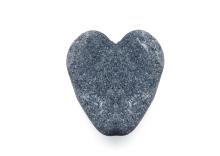
It is the tragedy of Christianity that the first hate crime in our constellation of texts is Matthew’s, in his telling the story of the passion. Jesus was a great teacher, an inspiring healer, and a man whose radical compassion touched everyone — women without honor, under-employed fisher folk, Roman soldiers, gentiles, Samaritans, scholarly Pharisees. The hearts of Palestinian Jews flocked to him, and this terrified the Romans. They tried to abort his movement by making his death a spectacle of cruelty and unutterable degradation.
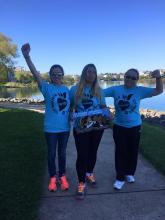
“In cities and towns across the country, women will walk for one mile on the 11th of each month for 11 months. Together we’ll walk another 100 miles for the 11 million undocumented immigrants in the United States.”

Caitlyn Jenner, Olympic athlete turned world-class glamour girl, took the planet by storm in June when she sat down for an interview with Diane Sawyer and announced her ongoing transition from male to female.
Now she’s back with an eight-episode miniseries, I Am Cait, that debuted July 26 on E!. The show, which airs in 154 countries and in 24 languages, serves as both classic reality TV lookie-loo entertainment and a spiritual exercise. Even the most Kardashian-resistant viewer can get something out of it.
Philosopher Martin Buber said, “All journeys have secret destinations of which the traveler is unaware,” and it’s clear from the very first moments of I Am Cait, when we see Jenner lying awake strafed by insomnia at 4:32 a.m., that she’s not sure where this whole thing is headed.
“What a responsibility I have,” she says to her camera bare-faced and bleary eyed.
“I just hope I get it right. I hope I get it right.”
FORGIVENESS IS wholeness, Nobel Peace Prize winner Archbishop Desmond Tutu and his daughter, Anglican minister Rev. Mpho Tutu, write in their newest collaboration,The Book of Forgiving. Scientific research shows that forgiveness has the power to transform us in spiritual, emotional, and even physical ways. That evidence is paired with the Tutus’ collective experience in counseling, studying, and teaching and their personal stories about the difficulty of forgiving. Archbishop Tutu writes about learning to forgive his abusive father. Mpho, who writes about learning to forgive the man who murdered her housekeeper in her home, is pursuing a PhD in the topic of forgiveness.
The book lays out some simple but critical truths: Everyone can be forgiven. Everyone deserves forgiveness. You must be willing to forgive. Forgiveness is not a weakness, nor a luxury. Forgiving others is a way to practice forgiving yourself. Through forgiveness, we all become whole again. Unconditional forgiveness is an act of grace that frees all parties from further indignity, and from self-blame and corrosive hatred.
The path to forgiveness seems simple enough when you can navigate it in four easy-to-follow steps: Tell the story. Name the hurt. Grant forgiveness. Renew or release the relationship. The path is also—sorry—a bit pedestrian. That doesn’t mean the route map isn’t useful. But the book will be most applicable if you have struggled to forgive or feel that even contemplating forgiveness is an impossible burden weighing heavy on your heart and soul. If you’re carrying a load you can’t seem to gracefully shrug off or leave by the side of the road, the Tutus can help you chart the course.
MY 5-YEAR-OLD daughter, Zoe, is in preschool. This means, as most parents of school-age children know, that there is a birthday party to attend approximately every other weekend of the year.
On the way to one of these myriad celebrations, we stopped by the church in downtown Portland, Ore., where my wife, Amy, is the senior pastor. She had a daylong meeting, and we needed to switch cars, as hers was the one with the gift in it.
As we came down the front steps of the church and onto the South Park Blocks, a local city park, we saw at least half a dozen emergency vehicles parked in a haphazard formation along the street and on the sidewalk in front of a small public restroom. Several officers were standing together, making calls on their radios and discussing the situation at hand. At their feet was what appeared to be a lifeless body, lying on the pavement underneath a blue tarp.
“Daddy,” Zoe said, “what are those police mans doing in the park?”
“I’m not sure, honey,” I said, “but it looks like somebody needed their help.”
“Is somebody in trouble?”
“Something like that,” I sighed. “Make sure you don’t drag that gift bag on the ground. We don’t want to mess up your friend’s present before we get to the party.”
My first thought was, God, please don’t let it be Michael. Michael is a man about my age who lives outside and wrestles daily with an addiction to alcohol, among several other things. We have helped him get sober, only to see him relapse. We helped him get into supportive housing, only to watch him get into a fight and get thrown back out onto the street.

Abba Moses asked abba Sylvanus, “Can a person lay a new foundation every day?” The old man said, “If they work hard, they can lay a new foundation at every moment.”
What then of skill? Virtuosity?
(I’m thinking a lot about skill, virtuosity, and the problems it presents. What good is it?)
I often wonder what it would be like to take pride in something rather than simply being prideful. It’s a trick, to say the least, to sort out the difference. To recognize skill, to possess the intention to do something well for the sake of doing something well treads that line. I wonder about the virtue of being good at something — of recognizing one’s skill and then situating that skill in some way that serves not one’s own agenda, one’s own ego, but that benefits the common good.
How do we know our own place in the commons? Is this even possible?


I created my SOLE space by providing one desktop computer per four students, a whiteboard to write questions on, and paper and pens for students to take notes for their sharing at the end of SOLE.
Then I asked a big question — “Why does a blue whale have such an enormous heart?” — and I let the adventure begin. My students began their investigations.
After 40 minutes, they shared their discoveries.
“Blue whales swim all over the world,” said Ki’ara, “So they need a gargantuan heart to be their motor.”
“Blue whales can call to each other over almost a thousand miles,” said Heavenly. “They need a big heart to talk to each other.”
“They swim together in pairs,” said Amare, “So they need huge hearts to care for each other.”
“Yeah,” said Isaac, “That’s true … it takes a huge heart to care for somebody.”
“Kids who are nice to me on the playground must have a big heart like a blue whale,” added Aydan. “And people who are mean must have small hearts.”
“Hmmm,” I said. “How can we have big hearts for each other instead of small hearts?”
CHRISTMAS, ON THE surface, looks like the most wonderful time of year—the season of love, lights, carols, candles, and family reunions, the time when Christians celebrate the birth of Jesus Christ. Look a bit deeper, though, and one might notice a more idolatrous narrative shining just as brightly: consumerism.
From Black Friday to New Year’s Day, we are inundated with the commercial demands of Christmas. For many, the list of things to do and gifts to purchase can seem endless. We buy into the mantra that the more money we spend, the more love we convey. We become lost in crowded stores, endless websites, and credit card debt. Christians often struggle to faithfully observe Advent, a time of waiting and preparation for the miraculous birth of Jesus.
While many of us purchase this spurious version of Christmas, a new movement has been born. It’s called Advent Conspiracy (AC), and its participants are seeking to turn Christmas upside down by exchanging consumption for compassion.
“Advent Conspiracy is not a four-point checklist on how to do Christmas. If anything, it’s a chance for us to rediscover the wonder and the mystery of the incarnation and what that means to us personally and what that might mean for the world,” said Greg Holder, lead pastor of The Crossing church in the St. Louis area.
IN 1900, long-simmering resentment over increasing foreign presence and exploitation in China boiled over into a full-scale uprising, the Boxer Rebellion. It was spearheaded by the “Righteous and Harmonious Fists,” a peasant secret society whose members practiced martial arts—Westerners, observing their exercises, dubbed them “Boxers.” The Boxers targeted foreign officials, merchants, and missionaries, as well as Chinese Christian converts.
Comic book author and artist Gene Luen Yang illuminates two very different fictional perspectives on this conflict in his new two-volume graphic novel Boxers & Saints: The first volume, Boxers, tells the story of Bao, a boy who becomes a Boxer leader after seeing ongoing abuse by Westerners; Saintsfollows Four-Girl, an unwanted daughter who converts to Catholicism, takes the name Vibiana, and must flee the Boxers.
Yang’s 2006 work American Born Chinese was the first graphic novel to both win the Michael L. Printz Award for excellence in young adult literature and to be nominated for a National Book Award. He lives in Oakland, Calif., and teaches in the Hamline University MFA program in writing for children and young adults. Sojourners senior associate editor Julie Polter interviewed Yang in July. Boxers & Saints releases in September from First Second Books.
Julie Polter: The characters in Boxers & Saints are driven by varied combinations of ideology (patriotism, cultural imperialism) and mysticism/faith. The flaws and virtues of different beliefs seem to mirror each other. What led you to this complicated story?
Gene Luen Yang: The genesis of the project was out of my own conflicts. I majored in computer science in college and minored in creative writing. I had a professor who was also a novelist, Thaisa Frank. I remember visiting her during office hours and talking to her about my struggles with writing about issues of faith. Faith, especially in college, became very important to me; it became a critical part of how I saw my place in the world. It was really hard for me to put something authentic on the page. Her advice to me was, essentially, you have to write your life and live your faith—you don’t ever try to write your faith, because it will come out funky. That’s the advice I’ve tried to follow ever since.
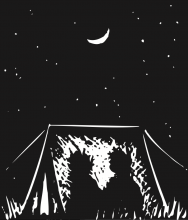
What kind of tentmakers are we? Are we more like Martha, so preoccupied with busywork that we neglect our neighbors, the guests of honor? Do we stand by and rejoice in the misfortune of others suffer the consequences of their own doing, rather than inviting them in and making room for them at the table, under the protection of our shade? When we see a stranger come by, do we drop everything, bring out the best of what we have and sit at their feet in humble service?

The Parable of the Good Samaritan is one of the most well-known, beloved, and influential portions of the New Testament. As a striking narrative about care and compassion for others, the content of Luke 10:29-37 has reverberated throughout the centuries as a clear and profound call to public love through personal action. All together, the radical hospitality of the Samaritan has sparked various charitable acts and organizations around the world. Thus, one can argue that no other parable has offered a more profound impact on the course of human history.
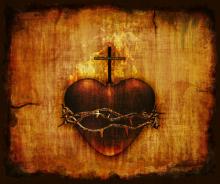
A few years ago I wrote a book about the experience of watching 24 consecutive hours of bad Christian television. My friends and family signed up for an hour each to watch along with me. The whole thing was insane, but things got especially crazy around 1 a.m. when a show called the Power Team was on. Now, thePower Team are a bunch of enormous steroid-muscled men who hold really loud Christian rallies in which they tear phone books in two and break 2x4s over their heads by the power of the Holy Spirit. And they talk a lot about what “the Lord” had done for them. It’s impressive stuff.
Anyway, so our own Andie Lyons was watching with me along with my friend Jerry. And the three of us watched in stunned silence for a moment trying to understand what it was we were seeing, at which point Andie finally said “so wait, basically they break stuff for the Lord?” and I answered yes, and then Jerry said “big deal, I break stuff all the time,” to which Andie asked, “but is it for the Lord?” and Jerry said, “well, it is now!”
Honestly the only reason I told you this story is by way of saying that I’m not a fan of the over-use of the term “the Lord. ”Like when people say “I just love the Lord,” I just never really know what that means. The way it’s casually thrown around makes me uncomfortable especially after Harry Potter, since Voldemort is called the Dark Lord. I just, I don’t know, I’m not saying it’s wrong, I’m just saying that for whatever reason, I can’t handle it.

OUR PLANE SITS at the gate in Brussels well past our departure time. Slowly, the empty seats fill with Somali refugees whose flight a day earlier had been cancelled. After a night in the airport, they slide wearily into scattered seats.
Ten years together in a refugee camp in Uganda has melded the group into a close-knit family. What do they feel now, I wonder, knowing that on the other end of this flight they will scatter, not to empty seats but to unknown cities throughout the U.S.? From Syracuse to San Francisco, they will look upon a world they have never imagined. “When will I see my friend?” one little girl asks, not realizing she and her friend will live half a continent apart.
I watch a man a few rows ahead of me. I learn from his friend that he suffers from headaches. I know enough about refugees to realize headaches will likely be the least of his challenges. He and his family will face a confusing culture, strange language, unfamiliar religious practices, unknown yet required skills, and new technology—from flush toilets to garage door openers, from light switches to iPads. Then they’ll have to sort out schools and jobs and health care. They’ll be starting over, basically, with nothing.
Almost nothing. One suitcase per person contains the bit of their past they carry into their future. These slim and elegant humans are traveling very light. Unless, of course, you count the weighty baggage of war and displacement.

By definition, an anesthetic is a drug used to relieve pain (analgesia), relax (sedate), induce sleepiness (hypnosis), spark forgetfulness (amnesia), or to make one unconscious for general anesthesia. Anesthetics are generally administered to induce or maintain a state of anesthesia and facilitate a procedure. I believe that anesthetic can be employed as a striking image for particular deficiencies in faith-based responses to extreme poverty.
As one can cite many examples where faith is proclaimed and practiced solely as an escape from – rather than engagement with – the numerous struggles associated with impoverishment, we recognize that anesthesia is incomplete without corresponding acts of sustainable social surgery.
...
A practical way to serve within the tension of anesthetic and advocate is to experience a small portion of life below the poverty line. The World Bank sets extreme poverty as below $1.50 per day, and I plan to stand in solidarity by attempting to eat on less than $1.50 per day over the course of five days (Monday – Friday).